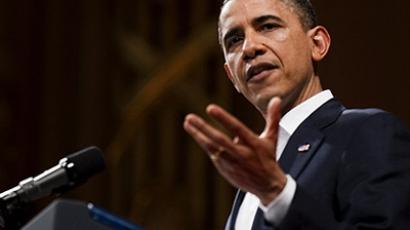Israel bombing, Libyan intervention: Signs of WWIII?

As conflict continues in Libya and unrest in the Middle East continues to spread, sparking fresh bombings in Jerusalem, is the world nearing yet another world war?
Jerusalem had been free from bombings over the past few years, but a package that exploded outside the city's central bus station ended that stride and wounding more than 20.The bombing followed Israeli air strikes which injured 18 people in the Gaza Strip, including seven children. Additional attacks near Gaza City left eight others dead.Many wonder whether unrest and protests will lead to greater tensions between Israeli and Palestinian. Will direct conflict break out and pull the US into another Middle East war?Will Libya turn into a catalyst for widespread regional war? What if intervention is needed in Yemen, the Ivory Coast or elsewhere? With the US and most of its allies already strained, where would the resources come from, what would be sacrificed?These are the questions many are beginning to ask. Medea Benjamin, a co-founder of CODEPINK, an organization dedicated to peace, argued the US should remain involved in democracy promotion and human rights, but not in violent conflict. “We shouldn’t be involved militarily,” she said. Seton Motley, the president of the organization Less Government said agreed, noting there is no reason to be involved in Libya, or elsewhere, unless there is a vital national interest to the United States.“We [US] have zero national interest in this,” he argued. Citing Egypt and Tunisia, Benjamin said it is possible for the US to offer support without getting involved militarily while allowing the people to create their own change in their own countries. “This [Libya] has turned into an armed struggle,” Benjamin said. “It looks like thing is going to go on for a long time. I think it is a big mistake to get involved in the middle of an armed conflict.” Motley agreed, but noted part of the success in Egypt was luck.Benjamin contended it was not luck, but the people’s pressure for change and the same thing could have happened in Libya without US intervention. “I wonder what could have happened in the case of Libya if it just kept growing as a non-violent movement,” she said. “We won’t ever know that.”“They weren’t afforded that opportunity,” countered Motley. “Ghadafi pulled out the guns rather quickly.” As the US and its allies intervene in Libya, a number of other nations have fallen to the way side. Protests continue to rock other parts of Africa and the Middle East. Motley argued there is no reason for a US intervention unless the US is at risk; no security threat to America, no intervention, he argued. Only if there is legitimate concerns should the United States get involved. If escalation between Israel and Palestine continues the US should let Israel handle their own problems, unrestrained. “These things end when there’s decisive victory,” he explained. “What we need to do is let Israel be Israel, take them off the leash, allow them to win decisively and these problems will end.”Escalation, if it occurs, should be taken care of by those involved. The US should not be responsible. Allow Israel to handle the problem, he argued. To the contrary Benjamin argued the US must restrain Israel more than they already do; keep them from responding and escalating the conflict. “If you ever want to see peace, it’s not letting Israel off the leash, believe me, it’s putting Israel on a leash,” she argued. “Unless Israel starts abiding by international law and the Palestinians have justice, there will never be peace.”














